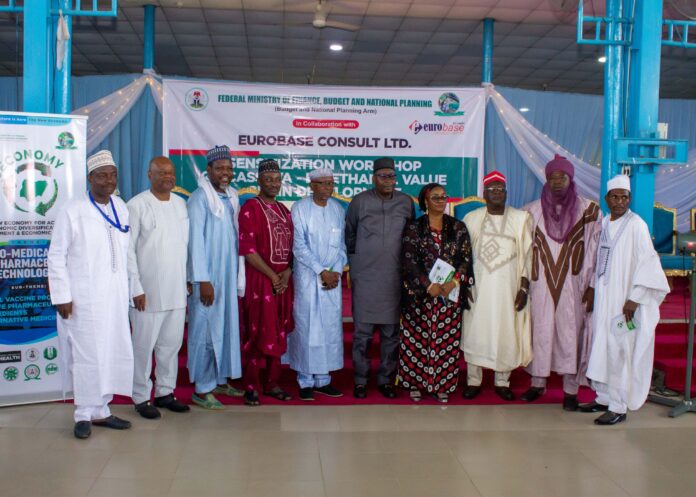The Federal Government has begun sensitization of stakeholders in the North-West on strategic implementation of the Cassava Bio-ethanol Value Chain project.
Speaking at the occasion, yesterday in Kano, Kano State, the Permanent Secretary, Budget and National Planning, Engr. Nebeolisa Anako, who was represented by the Director, Finance and Accounts in the ministry, Mr. Mohammed kabir, said that the aspiration of the federal government was to bring about higher Domestic Growth Product (GDP), and to significantly reduce unemployment by creating meaningful opportunities for the youths.
He explained that the bio-economic policy aimed at promoting sustainable economic growth and development by creating a bio-based economy that would contribute to job creation, poverty reduction, and increased access to food and energy.
The Permanent Secretary pointed out that this would be achieved through the development of cassava bio-economy and other bio-resources.
Engr. Anako lauded the Federal Ministries, Department and Agencies (MDAs) for their enduring partnership in developing the bio-economy policy, adding that it was a ministerial deliverable captured in the National Development Plan of 2021 – 2025.
He said that the framework would employ a Triple-Helix Knowledge Transfer Partnership in its implementation.
In his words “This includes the academia, research and development Institutes, farmers, the private sector and government MDAs, as well as civil society, development partners and development finance institutions”.
Anako stressed that It was pertinent to look at the bio-economy response and how it could contribute to the deceleration of the rising food insecurity.
“The country, at this time, needs an approach that will increase food production, youth employment, and increased growth through the provision of industrial feedstock and exportable products to boost our economy.
“To achieve this, one strategic pathway is to develop the Cassava Bio-ethanol Value Chain. This becomes even more imperative, given the recent removal of subsidy on petroleum products, re-evaluation of the Naira through the merging of official and non-official exchange windows,” he said.
In a keynote address, the Executive Governor of Kano State, Abba Kabir-Yusuf, said that the objective of the project was to demonstrate the efficacy of private sector-led approach in promoting investment in renewable biomass, wealth creation, provide jobs, reduce poverty and improve food security. He reaffirmed the state government’s commitment towards developing the project.
The Governor who was represented by the state Commissioner for finance, Ibrahim Jibrin, said a programme of this nature, would benefit a large population of the state.
In a message, the representative of the Association of Deans of Agriculture in Nigeria (ADAN), Prof. Olumyiwa James, explained the vision of ADAN which according to him, was to be an association of University professionals that would contribute significantly to the growth of Nigerian agricultural sector through the production of quality graduates of agriculture and engagement in problem solving agricultural research.
Prof. James added that the association had the mandate to promote and enhance the quality of teaching and research in facilities of Agriculture through Nigeria.
Also speaking, the project consultant, Prof. Ken Ife, said the workshop would highlight the inaugural focus on the Cassava bio-ethanol value chain project, which would stimulate industrial growth, enhance food production and availability, across the country.
He underscored the need to engage universities with a view to producing young bio-entrepreneurs and extension service agents to boost agricultural productivity.
Prof. Ife, emphasized the need to create new initiatives, aimed at addressing youth unemployment in the country.
In a panel session, the Director of Macro Economic Analysis Budget and National Planning, Mr Felix Okonkwo, said the objective behind the initiative was to reinforce government’s commitment towards achieving key national goals.
He listed the focus areas to include enhancing food nutrition, promoting agriculture and ensuring food security to the Sustainable Development Goals.
All participants who spoke at the workshop, commended the federal government for the project.
Mary Henshaw
PIO
BNP.






